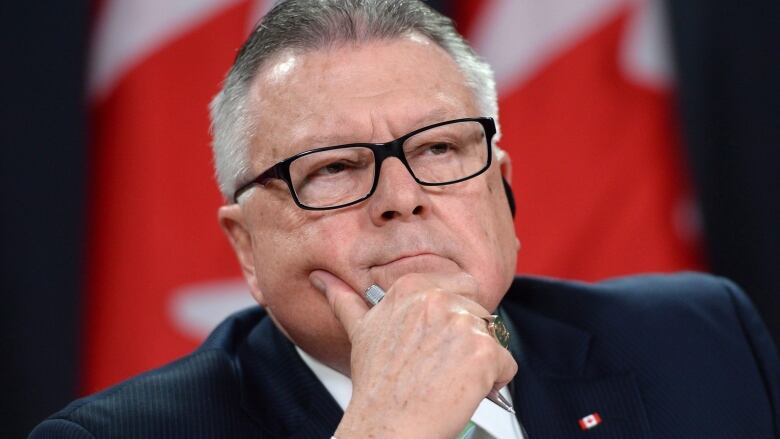Conservatives say security committee is a 'radical departure,' breaks election promises
David McGuinty-led intelligence committee formed without dialogue, Tories complain

Conservative critics are panning last Friday's announcement that veteran Liberal MP David McGuinty will have a "leadership role" on a new statutory committee of parliamentarians responsible for reviewing security-related issues.
Public Safety Minister Ralph Goodale's announcement came without "any meaningful dialogue with the security and intelligence community in Canada and without any consultation with parliamentarians," said public safety critic Erin O'Toole and Conservative House Leader Andrew Scheer in a press release issued Tuesday.
- Ralph Goodale says Canada must be 'world leader' in tackling radicalization
- Extra security screening not needed for kids under 18: Goodale
- Former SIRC boss says C-51 unconstitutional
"Minister Goodale's approach undermines the establishment of a committee that is supposed to be free from political agendas."
Goodale, who is in the U.K. this week consulting with parliamentarians and intelligence officials there who have experience with a similar oversight body, confirmed Tuesday that McGuinty was the government's choice to chair the committee.
"The prime minister has invited Mr. McGuinty to serve as chair and I'm very glad that David has been with me in these consultations, to have the benefit of that first hand reflection," he said.
McGuinty is travelling with Goodale but was not available for comment.
Forming the committee was an election promise and part of the mandate letter Prime Minister Justin Trudeau wrote to his new minister.
A press release sent out by the prime minister's office Friday said a more detailed proposal "will be brought forward in the coming months," in order to "meet its stated goal of strengthening national security oversight."
Goodale said it's time Canada added parliamentary oversight to its security agencies, something other members of the so-called Five Eyes intelligence alliance — the spy group comprising Canada, the U.S., Britain, Australia and New Zealand — already have.
"Canada is an anomaly here. The other four allies have had this mechanism for some considerable length of time. We have not," Goodale said.
"The important message is that the review processes, in terms of national security, need to be credible. They need to be seen in the eyes of Canadians as legitimate, that provide the kind of independent, solid, substantive review and oversight that the public can trust," Goodale said.
The public safety minister added that the previous Harper government squandered a moment, after the Oct. 22, 2014 attack in Ottawa, to work across partisan lines to address national security concerns.
'This is not a good sign'
The proposed review process would give all parliamentarians on the committee sufficient security clearance to be briefed confidentially on national security and intelligence matters, in order to serve as a check and balance against agencies overstepping legal bounds or violating human rights.
However, the Conservatives note, Goodale has not asked any opposition MPs to participate in this part of the process.

"For a government which pledged to work with all parliamentarians, this is not a good sign," O'Toole and Scheer's release said.
The previous Conservative government was criticized for weakening the oversight of Canada's spy agency, CSIS, when its internal watchdog office was shut down. The Security Intelligence Review Committee, which reports to Parliament, not the minister, has been criticized as insufficiently transparent and accountable. It also lacks sufficient power over the security agencies it supervises.
In addition, during former prime minister Stephen Harper's tenure, the politically-appointed members of SIRC were the subject of a number of controversies, most notably when former chair Arthur Porter was charged with fraud in connection with Quebec's corruption scandal. (Porter died last July.)
- ANALYSIS | SIRC's mixed record in watching Canada's spies — remember Air India?
- Pierre Blais, former justice minister and judge, named SIRC chair
- CSIS watchdog agency starved of staff, resources
"If the Liberal government wants to make such a radical departure from the way Canada has effectively conducted security oversight for over 30 years under the guise of having Parliament responsible for the process, they should at the very least engage Parliament in the process," the Conservative release said.
'Politicizing' new committee?
It's unclear whether this committee is meant to be a new standing committee of Parliament, or some other kind of committee of parliamentarians, which could allow the Liberals to wriggle free of the pledge to elect a chair by secret ballot.
N.B. Committee of Parliamentarians, not a parliamentary committee.
—@pmlagasseThe Conservatives noted that not only did the Liberals promise committee chairs would be elected by secret ballot in this Parliament, but that comparable security oversight committees in the U.K. and Australia form the committee first and then allow those members to pick a chair.
Announcing McGuinty as a pre-ordained chair "confirms the intention of the government to politicize a new committee that is supposed to be free from political agendas," the Conservatives charged� in their statement.
McGuinty has served as the MP for Ottawa South since 2004 and is a lawyer with experience working abroad on human rights issues. He is the brother of former Ontario premier Dalton McGuinty.
